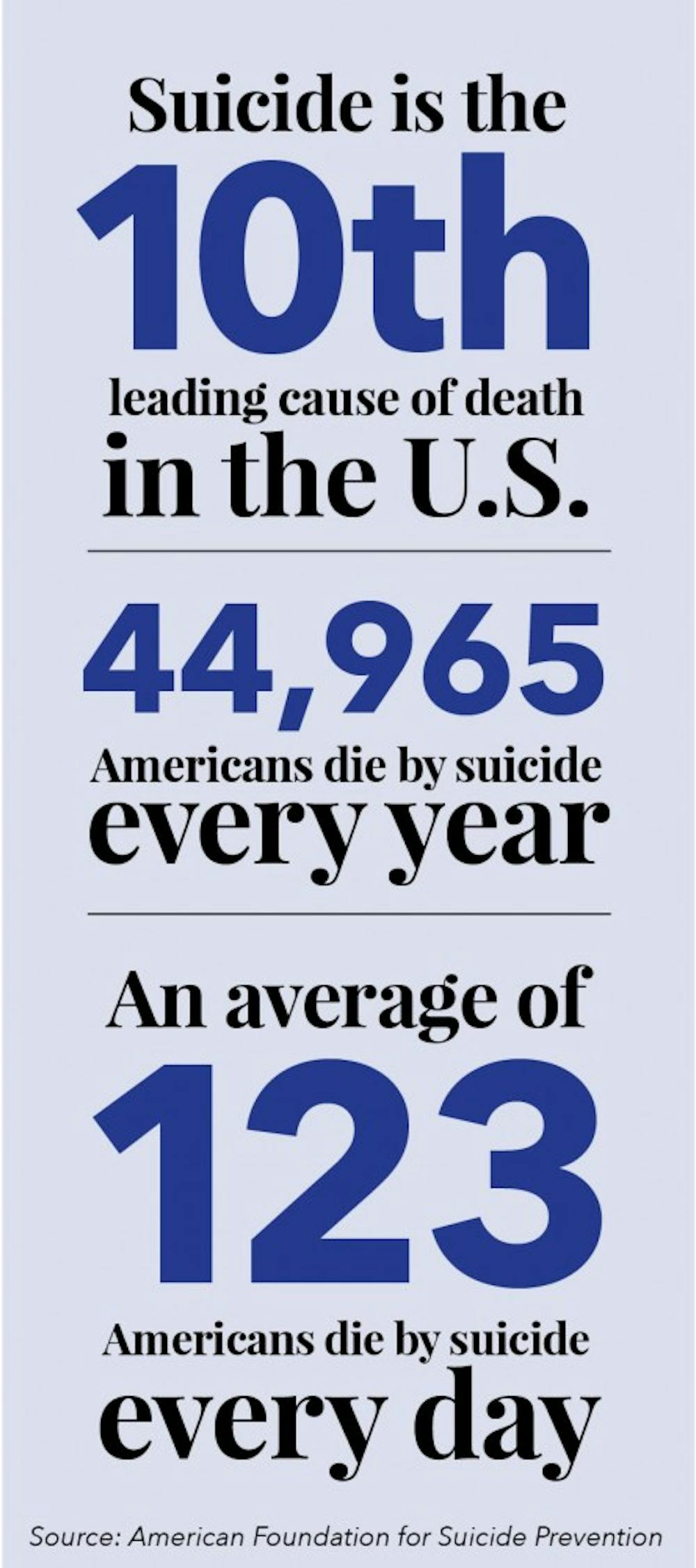
Demi Lawrence is a sophomore journalism news major and writes "Unspoken" for The Daily News. Her views do not necessarily agree with those of the newspaper. Write to Demi at dnlawrence@bsu.edu.
Editor’s Note: This article discusses topics such as suicide, depression and mental illness.
Suicide is something that is talked about so often in today’s society, but never seems like it can be talked about enough. We know suicide is a very sad and serious problem. We know that it is an issue that plagues our nation and world.
Depression and suicidal thoughts do not see age, race, sexual orientation, ethnicity or gender – it can affect any person.
September is National Suicide Prevention Month. Suicide is the 10th leading cause of death in the U.S., according to the American Foundation for Suicide Prevention (AFSP). More than 40,000 Americans die annually by suicide. That is an average of 123 deaths per day.
I have struggled with my mental health several times over the course of my life, but nothing so serious to where it left a lasting impact on me. Maybe I’d get blue for a few weeks, but I always bounce back.
I was one of those people who never understood the numbers, or the often times fatal issue. It had never directly affected me.
Then I got the text.
On Jan. 11, 2018, my best friend attempted suicide.
She simply sent me a selfie that night in her hospital bed, lifeless eyes looking off at something in the pale, white room she laid in. Her black hair laid in a tangled mess on her head. No text attached, just the photo on my phone screen. I didn’t need words to explain what had happened, I knew.
Thankfully, she survived. But that was the moment it got real for me.
It became all too clear that suicide is a dynamic issue, a problem that cannot be fixed overnight. It requires meticulous attention, research and patience.
I think it’s hard for any of us to understand the numbers and this often times fatal issue unless it directly affects us. Numbers are just symbols in a book or on a screen, or words you hear in conversation.
In 2016, the Centers for Disease Control and Prevention found that suicide is the second leading cause of death for 15 to 34 year olds.
But those numbers are just that. It doesn’t fully manifest with us. It’s not in front of us. Sure we see and comprehend these statistics, but we don’t see the physicality of the real people suffering, in these mere numbers and symbols.
I understand the numbers now; they are no longer just statistics.
They are a pair of tired eyes in an off-white hospital gown. They are fake smiles and salty tears against tired skin. They’ve manifested themselves into someone I care about.
Suicide is not just an action, or a problem that plagues our society.
Suicide is a person.
Suicide has a smile like us. Suicide walks to class like us. Suicide reads this story like us.
The best thing we can do for those struggling is to offer a helping hand.
Don’t just tell someone you’re there for them, really be there for them. Don’t let them pour their heart out about the monsters inside their head just to say “dang, that sucks.” Listen to them when they say they are not OK.
Depression often times falls hand-in-hand with suicide, so we must address the chemical imbalances and the triggers and warning signs of that as well.
In an interview with Everyday Health, Dr. Paula Clayton, AFSP medical director, said that 60 percent of those who die by suicide have “major depression.”
It’s no longer about “being there” for someone or telling them to “just cheer up”, it’s so much more than that.
Do your research on the signs of suicide.
Some of warning signs displayed in suicidal individuals include:
- Talking about suicide or not having a reason to live
- Withdrawal and isolation from family and friends
- Increase in alcohol and drug use
- Giving away prized possessions
- Excessive or minimal sleep
- Changes in mood and increased irritability
Don’t let the numbers become a reality.
Take care of yourself and your friends. Stop and evaluate your mental stability every so often, too. Be honest with yourself and those closest to you.
And above all, remember that it is OK to not be OK.
For additional information about suicide prevention or to speak with someone confidentially, contact the Ball State Counseling Center at 765-285-1736, National Suicide Prevention Lifeline at 800-273-8255 or the Crisis Text Line at 741-741. Both hotlines provide free, anonymous support 24 hours a day, seven days a week.





